
by Jane McCurry | Apr 25, 2019 | Renewables, Solar, Utilities, Wind
Across America, businesses are increasingly investing in clean, renewable energy. They know that the costs for wind and solar have plummeted, allowing the companies to take advantage of the low-cost electricity from renewables. In addition, customers, employees, and investors are increasingly looking to these businesses to make bigger commitments to improving their impacts on the world around us.
Over the past year, Chris Deisinger has acted as a consultant to RENEW Wisconsin to gather up all these corporate commitments to renewable energy, and do a deep dive into which of these national and multi-national firms have Wisconsin operations.
Today, we’re very excited to show you which of these national leaders have Wisconsin operations – and it’s a great list! These are companies who, over the coming years, will be searching for options to access renewable energy to cover the needs of their Wisconsin operations.
Corporations with Renewable Commitments & Wisconsin Operations
A timely example of renewable energy commitments in Wisconsin is Ashley Furniture, headquartered in Arcadia, Wisconsin. On Wednesday, Ashley announced a $29 million investment in renewable energy. The investment will be used to offset 35% of their energy use by installing solar panels at 10 of their largest facilities. Ashley expects to save at least $5 million in the first year.
Dozens of other companies in Wisconsin have also made commitments to renewable energy, including:
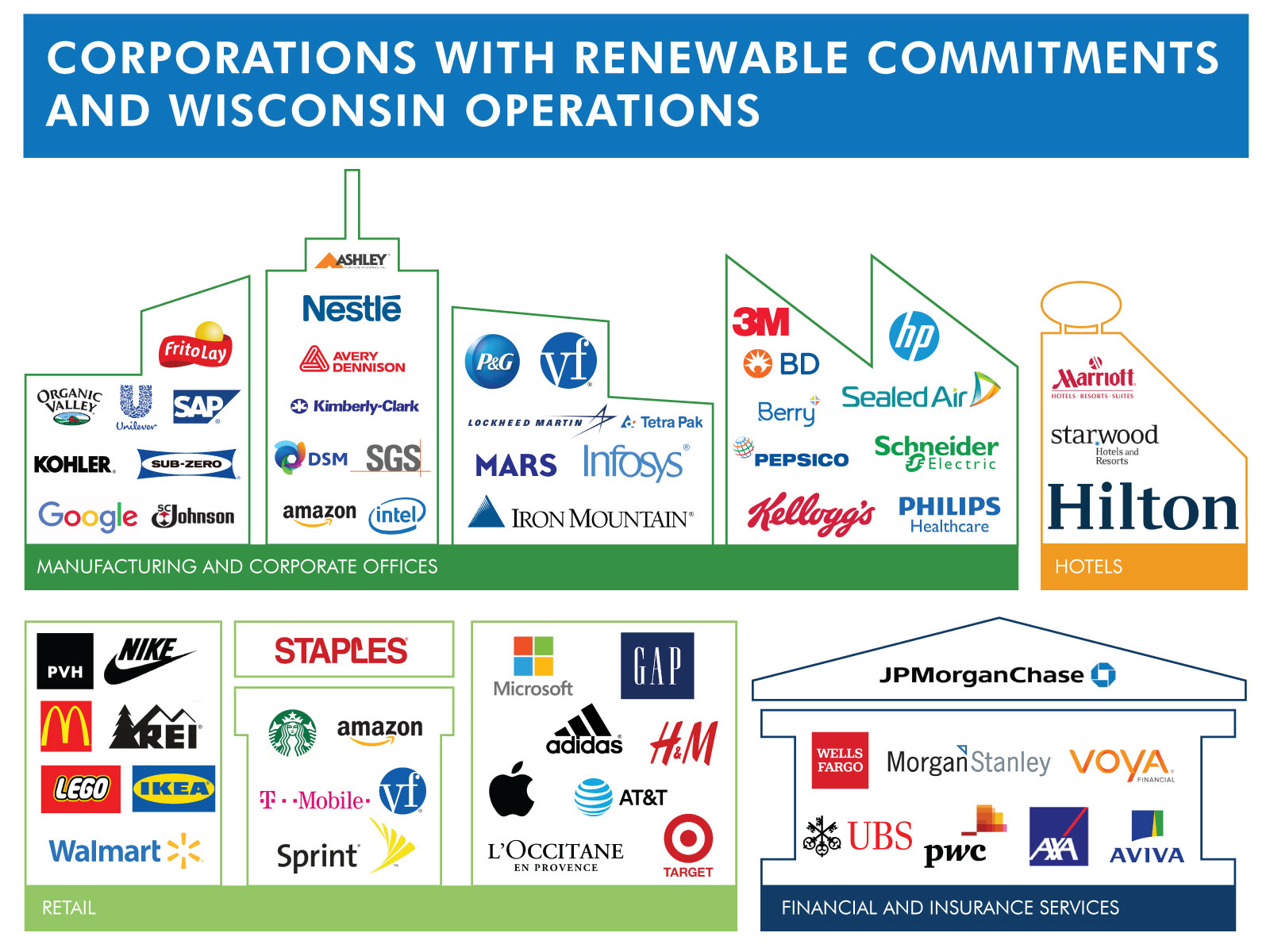
Utility Programs to Connect Commercial Customers with Renewable Energy
Wisconsin power companies are starting to put together programs to help companies like these, and other large customers, meet their renewable energy goals.
Two years ago, Madison Gas & Electric debuted a “Renewable Energy Rider” special service for its commercial customers, and just last month they announced they had the first two customers express interest.
Last fall, We Energies followed suit by proposing and gaining approval for a similar program that would enable their larger customers to sign up for access to dedicated renewable energy resources. We Energies was granted approval for their program in December 2018.
And, just a few weeks ago, Alliant Energy joined in, proposing a similar program again. Alliant’s program still requires approval from the Public Service Commission which oversees and regulates the utilities in Wisconsin.
A Brighter Future
Hopefully you caught Budweiser’s Super Bowl Commercial featuring their commitment to making every Budweiser with 100% wind energy. These are the types of success stories that can happen in Wisconsin too.
With dozens of corporations committing to renewable energy, and the utility programs to provide it, the future of renewables for Wisconsin is looking bright.
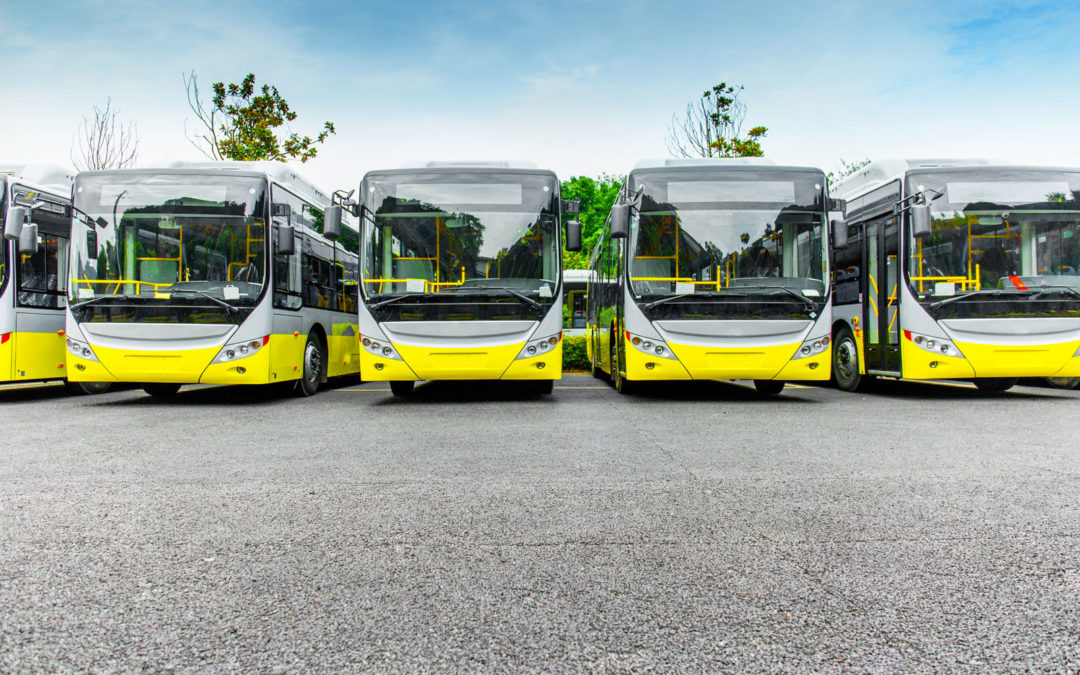
by Jane McCurry | Apr 18, 2019 | Electric Vehicles, Utilities
Electric buses offer quiet, peaceful, and fresh-smelling commutes for riders. Sounds pleasant, right?
In a previous blog, I highlighted the benefits of electric buses. They’re less polluting no matter where they operate, are more comfortable to ride in, cheaper to run, and can be powered by renewable energy. No wonder Wisconsin cities like Madison, Milwaukee, and Racine will see electric buses on their streets soon. These cities will be the first in Wisconsin to benefit from electric transit buses, but hopefully not the last.
Cities across the world are investing in electric buses
Cities all over the world are overhauling their bus fleets to replace dirty diesel with electric:
- Medellín, Columbia will get 64 electric buses in August.
- Moscow, Russia recently purchased 200 electric buses, some of which have been operating since last fall.
- Santiago, Chile purchased 100 electric buses which should be deployed soon
- Shenzhen, China has only electric buses. 16,000 of them.
Medellín and Moscow, Santiago and Shenzhen. While these cities are very different than Eau Claire or Green Bay, they show that electric buses make sense in locations around the world. And if they can do it, why can’t we?
Why aren’t all buses electric?
In short, the price tag. An electric bus costs almost twice as much as a diesel bus upfront, although they do save money in the long run on fuel and maintenance costs. But, since transit authorities operate with tight budgets, it’s often not feasible to prioritize electric buses unless we use creative financing methods to get electric buses for the same price as diesel buses.
The electric bus solution: PAYS®
We have solutions that can reduce the upfront cost barrier, save the bus owner money, and maximize the benefits that electric buses afford cities. It’s called Pay As You Save®, or PAYS®. PAYS allows the transit operator to purchase an electric bus with an investment from their utility, which the utility recovers over time through a fixed charge on the transit operator’s utility bill.
PAYS is a win, win, win solution that puts more electric buses on the road. The transit operator saves money each month thanks to those reduced fuel and maintenance expenses, even with the additional monthly charge. The utility makes money by selling more electricity, and we all benefit from less exposure to air pollution.
For more information about how PAYS works in practice, visit Clean Energy Works and watch their video above.
Proterra’s Solution: Leasing the Bus Battery
Electric bus manufacturer Proterra announced this week that they are scaling up their battery leasing program. Proterra’s program leases the bus battery to the customer, which brings the upfront cost of the bus down. Much like PAYS, the Proterra program aims to accelerate electric bus adoption by allowing transit operators to buy an electric bus for about the same price as a diesel bus. Operating funds that would have been spent on diesel fuel instead go toward the lease payment, leaving a little extra for savings.
Now is the time to move on electric buses
Buses last a long time. It’s important to start the transition now because any bus that hits the road now will likely last into the 2030s.
Ryan Popple, CEO of Proterra, summarized it well: “What worries me is that every time a new diesel bus deploys… You’re looking at 900,000 pounds of pollution on a 12-year deployment on a diesel bus.”
But it doesn’t have to be that way. Electric buses benefit the transit operator, riders, utilities, and citizens. Wisconsin has already started the transition to electric. Now is the time to speed it up by using these creative, proven financing models that are a win, win, win for Wisconsin.
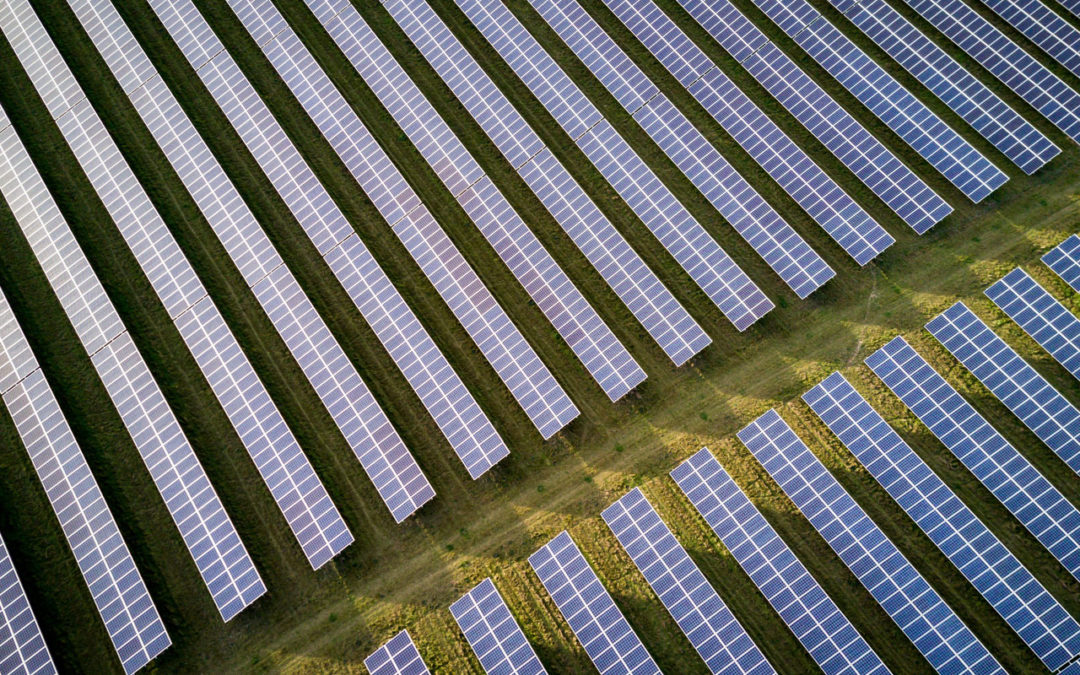
by Tyler Huebner | Apr 11, 2019 | Public Service Commission, Renewables, Solar, Utilities, Utility Scale
Today at its Open Meeting, the Wisconsin Public Service Commission approved five interrelated cases that will lead to a five-fold expansion of solar energy in Wisconsin.
The PSC approved:
- The Badger Hollow Solar Farm project in Iowa County, totaling 300 megawatts. Badger Hollow could become the largest solar electric plant in the Midwest when completed. In addition, the PSC approved a “tie line” that will deliver Badger Hollow’s output to a nearby substation, where it will be injected into the existing southwest Wisconsin grid.
- The Two Creeks Solar Project in Manitowoc County, totaling 150 megawatts. As with Badger Hollow, the PSC also approved a “tie line” that will deliver Two Creeks’ output to a nearby substation.
- Finally, the PSC approved an application from two Wisconsin utilities, Wisconsin Public Service based in Green Bay and Madison Gas & Electric, to acquire a total of 300 megawatts of this new solar capacity. The utilities will acquire the entire Two Creeks Solar Farm and a 150 MW share of the Badger Hollow Solar Farm. Wisconsin Public Service will acquire a total of 200 MW and Madison Gas & Electric will acquire 100 MW.
By RENEW Wisconsin’s estimates, the state of Wisconsin closed 2018 with about 103 megawatts of solar power, about 80% of that residing on homes and buildings, directly serving the customers who bought the solar arrays.
When completed, the 450 megawatts of solar would produce about 1.3% of Wisconsin’s annual electricity consumption, and supply electricity equivalent to the usage of about 116,500 Wisconsin homes. Both projects should be operational by mid-2021.
RENEW Wisconsin’s Executive Director, Tyler Huebner, said, “We are very happy to see the Public Service Commission approve these solar projects and find that it is cost-effective for two of our major utilities to own and operate these plants. It is a landmark day for solar energy in Wisconsin. Solar energy is a smart choice to meet the electricity needs of our citizens, businesses, and organizations, and without a state mandate to do so. With solar energy, we will produce homegrown, healthy energy right here in Wisconsin for years to come, and provide substantial economic benefits to the landowners and local governments who will host these projects.”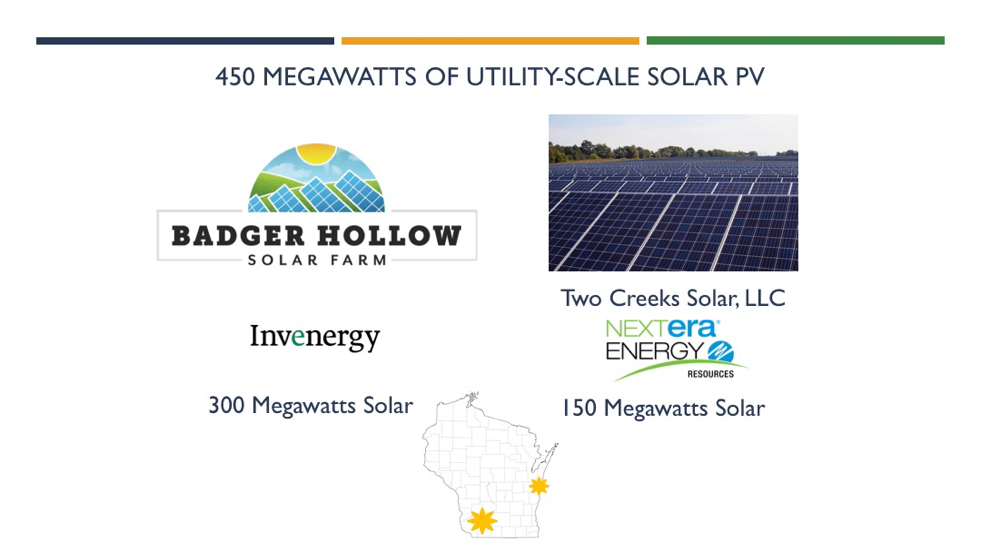
Today’s approvals build momentum for large-scale solar as a resource for power suppliers and utilities in Wisconsin.
- Three weeks ago, Dairyland Power Cooperative announced a commitment to purchase electricity from a 149 megawatt solar facility called Badger State Solar that would be located in Jefferson County. That project is subject to PSC approval as well.
- Just yesterday, April 10, the Richland County Board of Zoning gave final, and unanimous, approval to the 49.9 megawatt Richland County Solar Project developed by Savion Energy to be located in the Town of Buena Vista.
- In 2017, WPPI Energy announced it would purchase power from a 100 megawatt solar project near the Point Beach Nuclear Station. That project also will seek PSC approval in 2019.
Taken together, these five new solar projects account for approximately 749 megawatts of new solar power. If all are approved and built, they would supply 2.1% of Wisconsin’s annual electricity needs, and produce enough power to equal the annual usage of about 185,000 homes in Wisconsin. Beyond these projects, at least 4,000 megawatts of additional large-scale solar projects are being explored and developed in Wisconsin. We encourage you to learn more about large-scale solar energy, including our long list of questions and answers, at www.renewwisconsin.org/solarfarms.
About RENEW Wisconsin
RENEW Wisconsin is a nonprofit organization which promotes renewable energy in Wisconsin. We work on policies and programs that support solar power, wind power, biogas, local hydropower, geothermal energy, and electric vehicles in Wisconsin. More information is available on RENEW’s website: www.renewwisconsin.org.
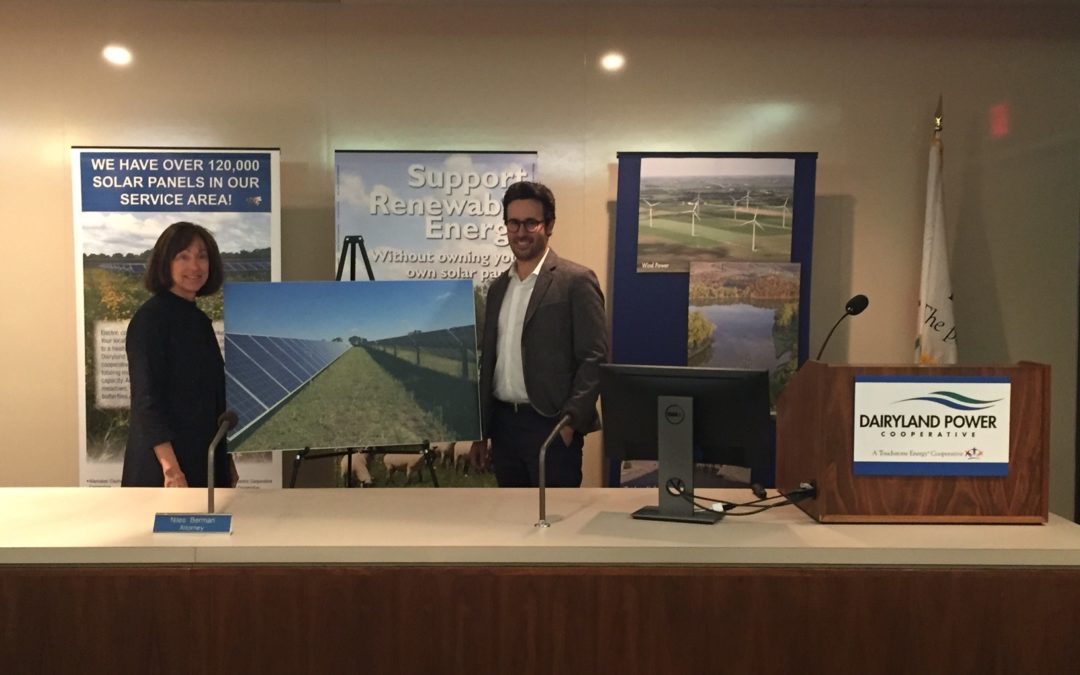
by Tyler Huebner | Mar 18, 2019 | Renewables, Solar, Utilities
Today at their headquarters in La Crosse, Dairyland Power Cooperative announced that it will be purchasing electricity from a major new Wisconsin-based solar energy facility being developed by Ranger Power.
The partnership involves a 149 megawatt solar power facility called Badger State Solar which is planned to be located in Jefferson County, Wisconsin. Ranger Power is planning to develop, own, and operate the project. Dairyland Power Cooperative will purchase all the electricity generated from the project through a long-term power purchase agreement.
The project will produce enough electricity to provide the equivalent annual needs of about 20,000 homes. If all approvals are granted from local and state permitting processes, construction would begin in 2020 and operation would commence in 2022.
RENEW Wisconsin’s Executive Director Tyler Huebner said, “Today’s announcement shows that solar power has become a cost-effective resource for Wisconsin’s major power providers such as Dairyland Power. By committing to this solar project which will be built right here in Wisconsin, Dairyland will meet its goals of a safe, reliable, affordable, and increasingly sustainable and diversified energy supply. We congratulate Dairyland Power Cooperative and Ranger Power on this historic announcement!”
By RENEW Wisconsin’s count, the state had about 103 megawatts of solar at year-end 2018, with Dairyland Power Cooperative responsible for about 20 megawatts, already placing it as the leader in the state for the amount of solar installed to-date. This project, along with a number of additional major solar projects, will dramatically increase the amount of solar energy produced in Wisconsin in the next five years.
More information about the project is included in the links below.
Dairyland Power Press Release
Badger State Solar Project Fact Sheet
Badger State Solar Project Economic Impact
Featured in image: Dairyland Power President and CEO Barb Nick and Ranger Power CEO Paul Harris

by Tyler Huebner | Jan 4, 2019 | Solar, Utilities
Just before the holidays, We Energies received approval from the Public Service Commission to begin two new renewable energy pilot programs.
The first is called the Dedicated Renewable Energy Resource program and would allow commercial, industrial, and local government customers to access large-scale renewable energy projects. The projects would allow larger customers to meet their sustainability and renewable energy goals, while potentially saving money, and We Energies could supply up to 150 megawatts of existing customer load with renewable energy through this program. The program would also allow an unlimited amount of new load to be served with renewable energy through this program.
The second program, called Solar Now, would enable We Energies to lease roof or ground space from customers. We Energies would own the solar projects, and pay lease payments to the host customers. The program could build up to 35 megawatts of solar. RENEW Members had various opinions about this program, which were reflected in our comments filed with the PSC.
We will keep you apprised as these programs roll out.
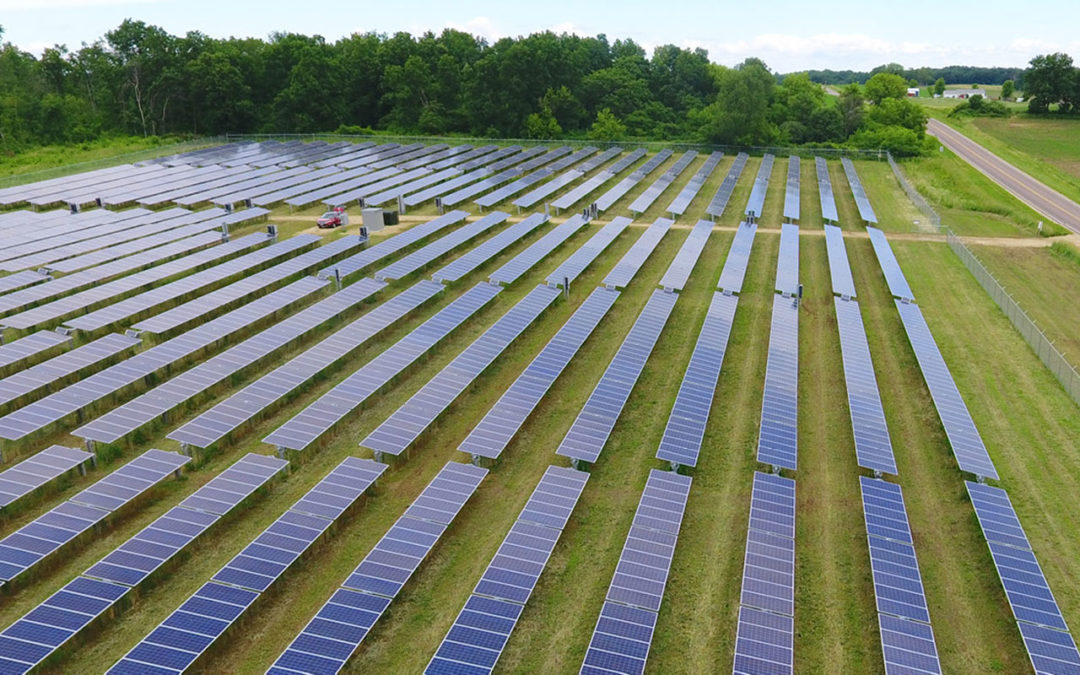
by Heather Allen | Jan 4, 2019 | RENEW Wisconsin, Renewables, Solar, Utilities, Wind
Home-grown renewable electricity is poised for a big breakout this year. Two solar projects large enough to replace fossil-fuel power plants are making headway, while utilities in Wisconsin have made stronger renewable energy commitments. At the same time an accelerating number of nonprofit organizations, businesses, and citizens are turning to renewable energy for their own use.
Hearings are set this month for the Badger Hollow Solar Farm in Iowa County and the Two Creeks solar project in Manitowoc and Kewaunee Counties. The Public Service Commission will likely decide whether to approve of the two projects in mid-March. The utilities Wisconsin Public Service (based in Green Bay) and Madison Gas & Electric plan to acquire 300 megawatts of generation capacity from these plants, enough to power over 70,000 average Wisconsin households. If the two projects are approved, the utilities will be able to reduce their fossil-fuel emissions while increasing supplies of renewable power in their energy generation mix.
We expect another wave of large solar power plants to follow soon after the PSC issues decisions on Badger Hollow and Two Creeks.
Wisconsin electric providers are driving this transition to renewable energy through their recently announced plans to scale back carbon emissions.
WI Utility Commitments to Reduce Carbon Emissions and Increase Renewable Energy
UTILITY
|
APPROXIMATE NUMBER OF CUSTOMERS
|
CURRENT WI RENEWABLES MIX
|
STATED GOALS OR RECENT ACTIONS
|
WEC (WE Energies and Wisc. Public Service)
|
1.1 million + 440,000
|
7% WE
7.8% WPS
|
80% CO2 reduction by 2050
|
Alliant (WI Power and Light)
|
460,000
|
13.3%
|
29% renewables by 2024
80% CO2 reduction by 2050
|
Dairyland Power
|
258,000
|
14.4%
|
PPAs for 98 MW Wind (2017), 20 MW solar (2016), 80 MW Iowa Wind (2016)
|
Xcel Energy
|
256,000
|
28% (systemwide)
|
80% CO2 reduction by 2030
100% CO2 reduction by 2050
|
WPPI Energy
|
200,000
|
14.5%
|
PPAs for 132 MW wind (2018) and 99 MW solar (2020)
|
Madison Gas and Electric
|
145,000
|
10.1%
|
30% renewables by 2030
80% CO2 reduction by 2050
|
How can you help accelerate clean energy?Increasingly, businesses and nonprofit organizations are also committing to renewable energy. Solar for Good, the grant program managed by RENEW Wisconsin to support non-profits going solar, announced its most successful round of funding ever in 2018. The program’s Fall 2018 round announced that 36 organizations have been allocated $445,000 in grants which will lead to $4.5 million in solar investment in Wisconsin. At the same time major businesses are committing to clean energy. On January 3, 2019, Advocate Aurora Health committed to 100% renewable energy by 2030 for its 27 hospitals and 500+ outpatient sites in Wisconsin and Illinois.
This tremendous momentum would not be possible without RENEW members and supporters of clean energy from all across Wisconsin. One important thing you can do is to help us ensure the Badger Hollow Solar Farm is approved. A strong showing of public support will help this project, which needs approval by the Public Service Commission.
Please support the Badger Hollow Solar Farm by adding your name as a supporter here.
Happy New Year!








